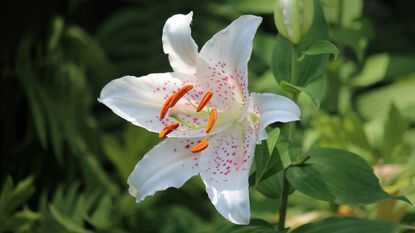
These plants that are toxic to cats are best avoided in your yard and home if you want to keep your feline friend safe and healthy. Cats are compulsory carnivores and don't eat plant matter at all. In fact, their livers haven't evolved to have the enzymes necessary to break down plant nutrients, so many common plants can do your cat real harm.
The good news is that you won't have to alter your garden scheme completely as there are many cat-friendly plants out there also. Most cats are fine around most plants most of the time. There are just a few species that are too dangerous to chance it around your pet.
Plants that are toxic to cats
The first thing worth mentioning is that unless we're talking about garden plants that have loose pollen that your cat could accidentally pick up by brushing past (see number one on our list especially), your cat is not very likely to get poisoned by a plant in your yard or garden. Cats are inquisitive by nature and sometimes do like to a nibble on a blade of grass or a grass-like leaf, but most adult cats are uninterested in eating unfamiliar plants.
Joey Difrancesco, founder of Lolahemp, reassures cat owners that if you mainly do vegetable gardening, your cat is likely to be safe: 'most garden plants are safe for cats to be around and even swallow. Vegetables are largely safe, and many of the other plants that grow naturally around gardens are fine for cats to nibble on as well. For the most part, flowers and non-edible plants are the ones that could cause
cats trouble.'
With that in mind, these are the plants, most of them flowering varieties, that you should consider excluding from your yard if you have a cat.
1. Lily: toxic to cats
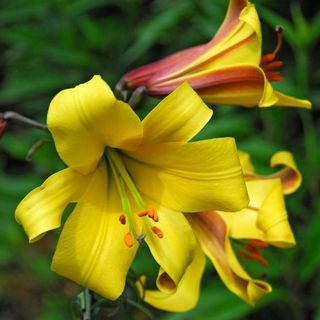
Most species of lily are highly toxic to cats (think tiger lily, Easter lily, etc), and even ingesting a tiny bit of their pollen can be fatal, causing kidney damage. It really is best to avoid them altogether if you have a cat, and if you suspect your cat has ingested any part of a lily plant, you must take them to an emergency vet at once.
2. Amaryllis: poisonous to cats
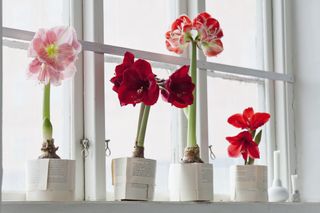
Amaryllis is a popular indoor plant gift, but avoid giving it to cat owners: all parts of the plant are highly poisonous to cats, and ingesting it can cause changes in blood pressure, seizures, and severe vomiting.
3. Dieffenbachia: harmful to cats
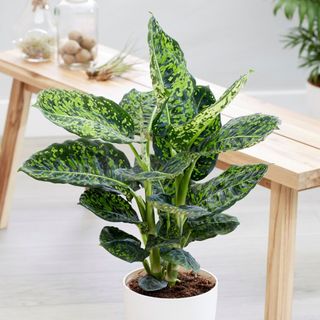
Dieffenbachia's common name is 'Dumb Cane', and no wonder: chewing on a leaf can cause severe pain and numbness, as well as excessive salivation and difficulty swallowing. It won't kill your cat, but the effects are highly unpleasant, so avoid it in your home if you have a feline (or a puppy, or a toddler, for that matter). Look to different pet-friendly house plants rather.
4. Chrysanthemums: toxic to cats
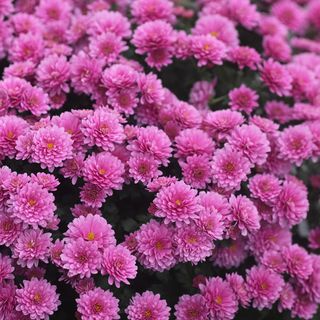
Chrysanthemums are toxic to cats, especially if ingested in high amounts – potentially a problem in kittens and younger cats who may be enticed by their fluffy texture. Symptoms include vomiting, diarrhea, dermatitis, or lack of coordination.
5. Foxglove: highly toxic to cats
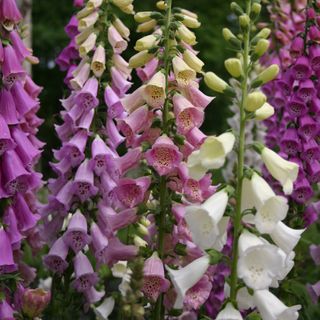
Foxgloves are a common, cottage garden plant often used in more traditional garden settings, but it is highly toxic to cats, affecting their heart; in severe cases, ingestion can lead to cardiac failure and death. Although many cat owners grow foxgloves in their gardens without a problem, kittens and younger cats should be watched when around these plants.
6. Delphinium
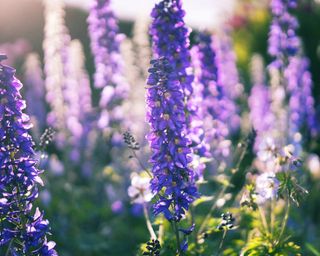
Delphiniums are pretty flowering plants that provide height in garden borders. Unfortunately, these are plants that are toxic to cats. Jay Riggs, from Zeal CBD, says that 'these are very poisonous to both humans and animals'. Fortunately, delphiniums will only poison your cat if ingested.
7. Wisteria
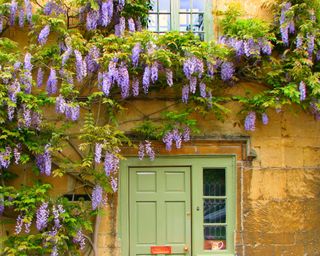
A highly ornamental climbing plant that looks gorgeous trained up a trellis or arch, wisteria is highly poisonous to cats, dogs, and horses. It's the seed pods you need to watch out for, 'so be careful if your pet explores the garden or neighboring fields alone'. If you have wisteria growing in your backyard, regularly pick the seed pods.
8. Yew
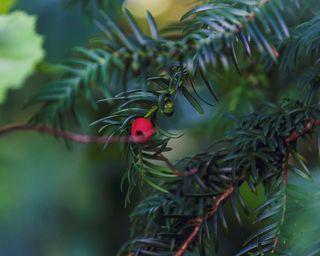
Yews are commonly grown as hedge plants or as front yard trees, and their dense fir-like foliage is a great way to enhance privacy in your yard and use as garden screening. However, yew is extremely poisonous to humans and animals. All of the plant is poisonous, but the berries are lethal and will kill a human, let alone a cat. Best avoided if you have a cat that like nibbling on plants.
9. Hydrangea
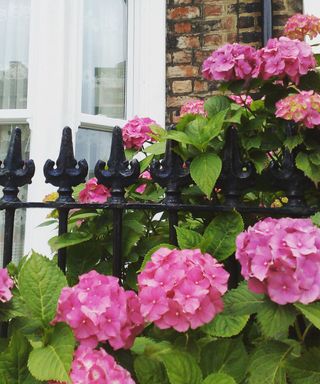
Hydrangeas are a cottage garden favorite with showy, fluffy blooms that often carry on well into the fall. Hydrangeas are poisonous to cats, but they're rarely a real problem because cats rarely take interest in them.
10. Oleander
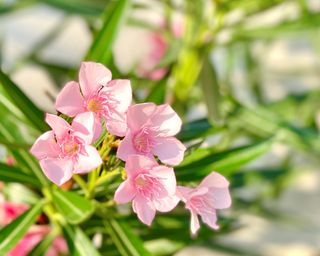
Oleander is an exotic plant that can make a real statement in your yard, but be aware that, as Riggs warns, 'this is one of the most toxic plants to humans and pets, just touching the plant and tree sap with your bare hands or inhaling smoke of burning oleander can induce toxic effects.' If you want a blossoming shrub in your yard, consider jasmine instead as it's one of the best plants that are not poisonous to cats.
Garden plants poisonous to cats: the most common
- Aconitum
- Actaea
- Aesculus
- Agrostemma githago
- Aleurites
- Allium
- Alocasia
- Alstroemeria
- Anagallis
- Anemone
- Angel’s Trumpets
- Angel Wings
- Apricot
- Aquilegia
- Arisaema
- Arum
- Astragalus
- Avocado
- Azalea
- Baneberry
- Bird of Paradise
- Black-eyed Susan
- Bloodroot Box
- Broom
- Bryony
- Buckthorn
- Burning Bush
- Buttercup
- Caesalpinia
- Caladium
- Caltha
- Celastrus
- Centaurea cyanus
- Cestrum
- Cherry Laurel
- Chincherinchee
- Chrysanthemum
- Clematis
- Colchicum
- Columbine
- Conium majalis
- Corncockle
- Cornflower
- Cotoneaster
- Crocus
- X Cupressocyparis leylandii
- Cyclamen
- Cytisus
- Daffodil
- Daphne
- Delonix
- Delphinium
- Dendranthema
- Dicentra
- Dictamnus
- Digitalis
- Echium
- Elder
- Euonymus
- Euphorbia
- False Acacia
- Ferns
- Ficus
- Flax
- Foxglove
- Frangula
- Fremontodendron
- Gaultheria
- Giant Hog Weed
- Glory Lily
- Helleborus
- Hemlock
- Henbane
- Heracleum mantegazzianum
- Hippeastrum
- Holly Horse Chestnut
- Hyacinthus
- Hydrangea
- Hyoscyamus
- Ilex
- Iris
- Ivy
- Jasminum
- Juniperus sabina
- Kalmia
- Kalanchoe
- Laburnum
- Lantana
- Lilium
- Lily of the Valley
- Linum
- Lobelia* (except bedding Lobelia)
- Lupinus
- Madagascar Periwinkle
- Marigold
- Melia
- Mirabilis jalapa
- Narcissus
- Nerium oleander
- Nicotiana
- Deadly Nightshade
- Woody Nightshade
- Oak
- Ornithogalum
- Oxytropis
- Papaver
- Parthenocissus
- Peach
- Peony
- Pernettya
- Persea americana
- Philodendron
- Physalis
- Phytolacca
- Pokeweed
- Poppy
- Primula obconica
- Privet
- Prunus armeniaca
- Prunus laurocerasus
- Ranunculus
- Rhamnus
- Rhododendron
- Ricinus
- Robinia
- Rosary Pea
- Rudbeckia
- Rue
- Sambucus
- Sanguinaria
- Schefflera
- Scilla
- Skunk Cabbage
- Snowdrop
- Solandra
- Solomon’s Seal
- Strelitzia
- Sumach
- Sweet Pea
- Tanacetum
- Tetradymia
- Thornapple
- Thuja
- Thunbergia
- Tomato
- Tulipa
- Veratrum
- Viscum
- Wisteria
- Yew
House plants that are poisonous to cats
We are big fans, but if you've got a curious kitten or a cat that tends to nibble on your house plants, here's what to avoid:
- Aphelandra
- Azalea
- Castor Oil Plant
- Christmas
- Cherry
- Codiaeum
- Croton
- Cyclamen
- Devil’s Ivy
- Elephant’s Ear
- Epipremnum aureum
- Ferns
- Holly
- Hypoestes phyllostachya
- Hyacinthus
- Ivy
- Kalanchoe
- Mistletoe
- Nerium oleander
- Oleander
- Ornithogalum
- Seneciotar of Bethlehem
- Umbellatum
- Umbrella Plant
- Zebra Plant
How to keep your yard cat-friendly
Although cats are fastidious creatures and will rarely eat non-food items, there are a couple of things you need to keep out of your garden (and ideally ask your neighbour to remove those substances from theirs):
- Antifreeze: sadly, this is a common cat killer in our gardens, as cats are inexplicably fond of the taste. The worst is that it's often too late to save the cat by the time you notice the symptoms, so it's really best to avoid antifreeze altogether;
- De-icing salts: the most common form of salt used to de-ice pavements and driveways is sodium chloride, and it's toxic when ingested, most often after a cat has walked on a treated surface and licked the salt off its paws;
- Insecticides and herbicides, especially if large areas of the garden are treated.
What is the most toxic plant for cats?
Of all the plants that are toxic for cats, you really need to watch for lilies. Lily pollen is so toxic that even a small amount can kill your cat. This includes cut flowers in your home, so if you have a cat, it is strongly advisale to avoid lilies completely.
What should I do if I think my cat has eaten a poisonous plant?
If you suspect that your cat has eaten a poisonous plant, you must take them to the vet without delay. With poisoning, time is of the essence, so don't take the 'let's wait and see' approach.
Be sure to give the vet as much information as you can on what your pet may have ingested (a sample is ideal).
Note that if you've seen your cat eat a poisonous plant but can't see any symptoms, you'll still need to take them to the vet as a precaution.
Join our newsletter
Get the best home decor ideas, DIY advice and project inspiration straight to your inbox!
Anna is a professional writer with many years of experience. She has a passion for contemporary home decor and gardening. She covers a range of topics, from practical advice to interior and garden design.